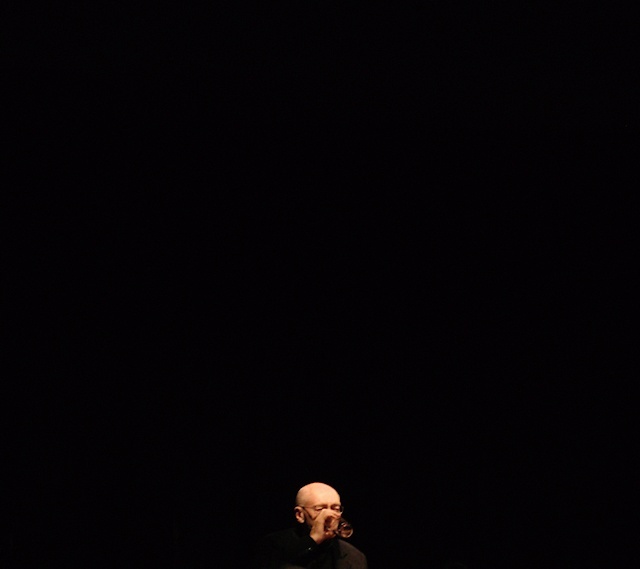unfortunately singular
The event was certainly neither intended to be nor realised as a good old-fashioned slanging match between a Believer and a scientist, despite the large potential entertainment value thereof. Although Former Bishop Holloway is a former bishop and still an active church-goer he seems a perfectly reasonable and almost-entirely rational person with some decent philosophies and sensible ideas, particularly those in which he has found disagreement with some of the more senseless doctrines of his particular strain of Religion. As the talk went on the thought probably foremost in the minds of many (and which was later put as a question) was why he still chose to place himself on the capitalised Believer side of the line when to all intents and purposes he seemed to simply be an Humanist and atheist. Had I asked the question I'd have asked why in particular he included any Official Religion whatsoever in his self-tagging as a "Buddhist Quaker Anglo-Catholic Agnostic"; he offered the half-opinion that he's fine with Jesus as an historical figure who recommended that people be vaguely nice to other people (equivalent to others such as Ghandi or Buddha) and was "a non-theistic christian" and was for "the Jesus of history rather than the christ of faith".
It seems a little like he would prefer there to be a much better way of describing himself rather than as a selection of best-fits-there-are in which case it's probably better to not go for a fixed description at all if they only cause trouble. That is why I was at pains to describe people in terms of what they do or did rather than defining people under either my or their tags the other day despite the contrary impression seemingly formed. That's also why I quite like ad-hoc portmanteau words when you need to write the lexical equivalent of a vague hand-flapping motion.
Dawkins at one point brought up a point I was rather pleased to hear; if people like Holloway (who count themselves amongst the religious but shy away from the more evangelical and fantastical/fanatical side of things) see the mythology of (for example) the christian faith as mythology (though (like any prose) capable of containing wisdom or philosophy of value) rather than historical fact then why place this one particular mythology above others (including those of other religions)? In part it seems due to familiarity; you remember what you're taught when you're young, especially if you share it with family and friends. Myths certainly survive when there are a lot of people remembering them together but some only do so at the level of folk tale whilst some are taught in history classes as official myths but a dangerous few are still currently taught as fact by people who claim to believe and seek to make others believe that things for which there can be found no more substantial evidence than some many-time-rewritten writings from millennia in the past are true. The example given... young-earth creationism.
I'd have happily listened to them for several more hours, especially with Aubrey Manning chairing the discussion (a little bit like Attenborough when enthusiastically lecturing about evolutionary biology (even in plants) and prone to involuntary facial expressions which reveal his opinions about particular subjects very clearly) but they packed up only ten minutes beyond the allotted hour. Had I not been working tomorrow I'd have gladly bustled around the front and tried to ask some questions but instead merely checked that my recording devices had functioned (phone OK but MP3 player didn't work) and left.
It was perhaps telling that whilst the Humanist Society of Scotland were permitted to stand half-way up the stairs inside the theatre to hand out their leaflets the people with the "The Evolution Crisis" books ("Which side are you on?" "Ummm the ummm Creationist side" (which he at least had the residual good sense to look as well as sound vaguely apologetic about)) had to stand outside where they were mostly ignored.


Comments
Sign in or get an account to comment.


